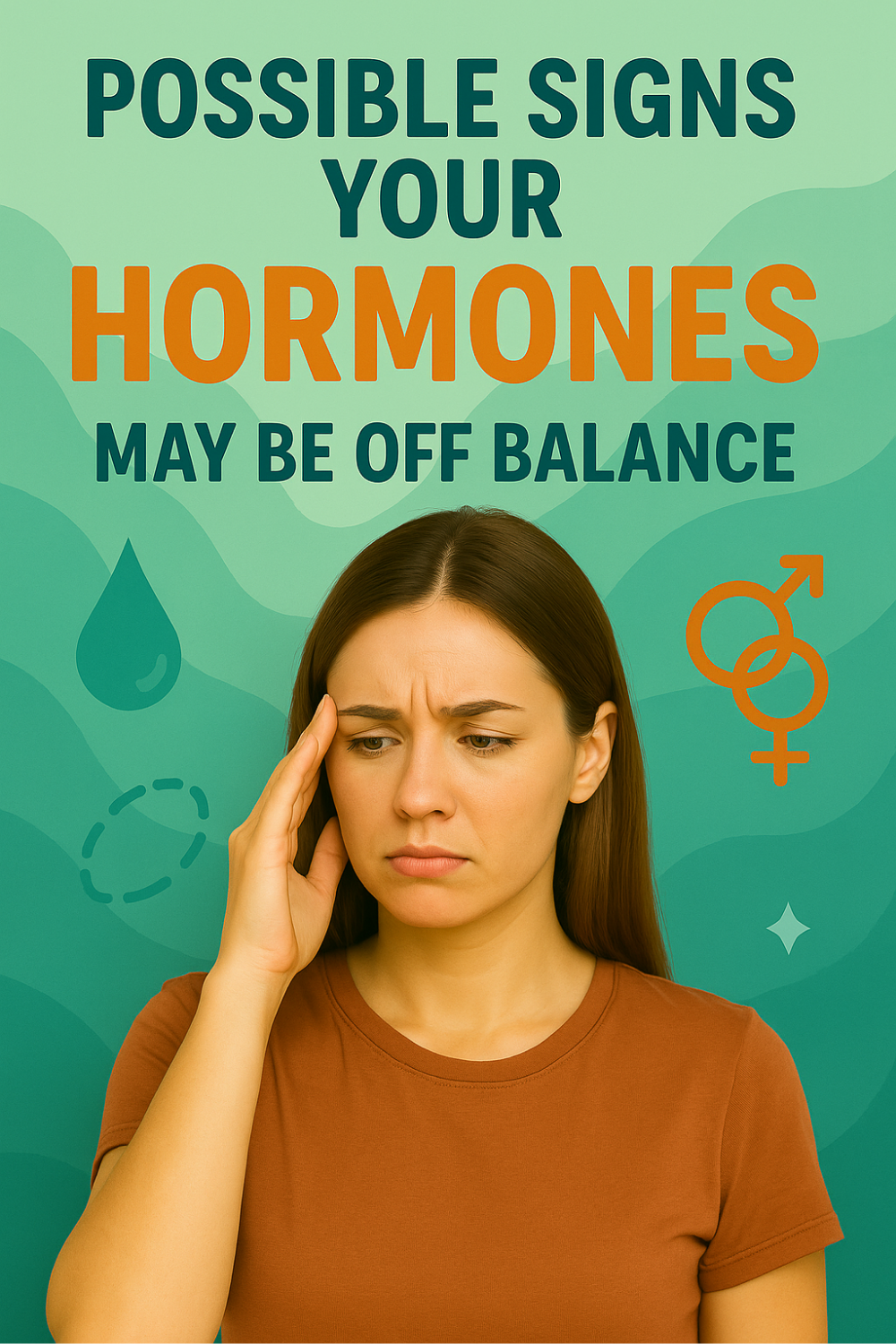Hormonal balance is crucial for overall wellness, influencing everything from your mood and energy levels to metabolism and reproductive health. Recognizing common signs your hormones may be off balance helps you take proactive steps to restore equilibrium and support long-term health. Early awareness of hormonal imbalances empowers you to manage symptoms naturally, improve quality of life, and maintain better physical and emotional well-being.

- Understanding Hormonal Imbalance
- Common Symptoms of Hormone Imbalance
- Physical Signs of Hormonal Issues
- Emotional and Mental Health Indicators
- Lifestyle Factors Contributing to Hormonal Imbalance
- Natural Ways to Rebalance Hormones
- When to See a Healthcare Provider
- Common Mistakes in Addressing Hormone Imbalance
- Daily Habits for Hormonal Health
- Tracking Your Hormone Health Progress
Understanding Hormonal Imbalance
Hormones are chemical messengers regulating various bodily processes, including metabolism, mood, sleep, and reproductive functions. When hormones become imbalanced—whether due to stress, lifestyle factors, aging, or underlying health conditions—symptoms emerge, significantly affecting physical and emotional health. Recognizing hormonal imbalances early enables timely interventions to effectively restore health and vitality.
Common Symptoms of Hormone Imbalance
Identifying common symptoms helps pinpoint potential hormonal issues:
- Persistent Fatigue: Feeling constantly tired despite adequate rest indicates potential hormonal disruptions.
- Mood Swings and Irritability: Frequent emotional changes or unexplained irritability suggest hormonal shifts.
- Unexpected Weight Changes: Sudden weight gain or loss without dietary or lifestyle changes often signal hormonal issues.
- Irregular Menstrual Cycles: Menstrual irregularities are common indicators of imbalanced hormones.
- Changes in Libido: Significant fluctuations in sexual desire frequently reflect underlying hormonal imbalance.
Physical Signs of Hormonal Issues
Your body provides clear signals when hormones are imbalanced:
- Skin Problems: Acne outbreaks, dry skin, or increased skin sensitivity often link to hormonal disruptions.
- Hair Loss or Thinning: Sudden hair thinning or increased hair loss may indicate hormonal fluctuations.
- Digestive Issues: Frequent bloating, constipation, or gut discomfort can stem from hormone-related digestive changes.
- Sleep Disturbances: Insomnia, restless sleep, or disrupted sleep patterns frequently accompany hormone imbalances.
- Hot Flashes or Night Sweats: Common during menopause but also indicative of hormonal shifts at any age.
Emotional and Mental Health Indicators
Hormonal imbalance significantly affects emotional and mental health:
- Anxiety and Depression: Hormones deeply influence brain chemistry, contributing to anxiety or depression.
- Brain Fog: Difficulty concentrating, memory lapses, or reduced mental clarity frequently signal hormonal disruptions.
- Increased Stress Sensitivity: Heightened stress reactions or difficulty managing stress suggest possible hormonal imbalance.
Understanding these emotional and cognitive signs helps quickly identify hormonal issues.
Lifestyle Factors Contributing to Hormonal Imbalance
Certain lifestyle choices can significantly impact hormonal balance:
- Poor Diet: Diets high in sugar, processed foods, or lacking essential nutrients disrupt hormonal harmony.
- Chronic Stress: Persistent stress elevates cortisol levels, negatively impacting overall hormonal equilibrium.
- Insufficient Sleep: Consistently inadequate sleep disrupts hormonal regulation, particularly affecting cortisol, melatonin, and insulin.
- Sedentary Lifestyle: Limited physical activity reduces hormonal balance, particularly affecting metabolism and insulin regulation.
Recognizing lifestyle factors helps address and correct underlying hormonal imbalances naturally.
Natural Ways to Rebalance Hormones
Simple lifestyle adjustments significantly help restore hormonal balance naturally:
- Dietary Changes: Eating nutrient-dense, whole foods rich in healthy fats, fiber, and lean proteins helps stabilize hormones.
- Stress Reduction Techniques: Incorporate mindfulness, meditation, or yoga regularly to lower stress hormones like cortisol.
- Regular Exercise: Moderate, regular exercise enhances hormonal regulation, improves mood, and balances insulin levels.
- Prioritize Sleep: Establish consistent sleep patterns, ensuring 7–9 hours nightly to maintain hormonal stability.
Integrating these adjustments steadily promotes lasting hormonal health and balance.
When to See a Healthcare Provider
Seek medical attention if hormonal imbalance symptoms persist or significantly disrupt daily life despite lifestyle changes. Healthcare providers can perform hormone testing and provide targeted treatment options or therapies. Early intervention ensures effective treatment, preventing long-term complications or chronic health issues associated with untreated hormonal imbalances.
Common Mistakes in Addressing Hormone Imbalance
Avoid frequent pitfalls that hinder hormonal balance restoration:
- Ignoring Symptoms: Recognize and address symptoms early rather than waiting for severe health issues.
- Over-Reliance on Supplements: Excessive supplementation without professional guidance can worsen imbalance.
- Inconsistent Habits: Sporadic dietary or lifestyle adjustments rarely achieve sustained hormonal balance.
- Skipping Medical Advice: Consult healthcare professionals rather than solely relying on self-diagnosis or internet information.
Avoiding these errors supports effective, lasting hormone rebalancing.
Daily Habits for Hormonal Health
Consistently incorporating these daily habits significantly supports hormonal health:
- Start your day with a nutritious, balanced breakfast to stabilize blood sugar and insulin.
- Include mindfulness or meditation for stress management daily.
- Maintain consistent bedtime routines to regulate sleep-related hormones.
- Engage in gentle daily movement such as walking, yoga, or stretching.
These simple yet effective habits naturally maintain hormonal equilibrium.
Tracking Your Hormone Health Progress
Documenting your hormonal health journey clearly illustrates improvements, guiding further actions. Regularly note symptoms, their frequency, and severity, observing noticeable changes. Track dietary and lifestyle adjustments, correlating improvements in symptoms or mood. Clearly seeing progress motivates continued healthy habits and ongoing hormonal health improvement.
Frequently Asked Questions
What are the earliest signs of hormonal imbalance?
Common early signs include fatigue, mood swings, irregular menstrual cycles, and sudden weight changes.
Can hormonal imbalance affect mood significantly?
Absolutely, hormones deeply influence mood, frequently contributing to anxiety, depression, and emotional fluctuations.
Are natural methods effective for hormonal balance?
Yes, consistent lifestyle adjustments like diet, exercise, and stress management effectively restore and maintain hormonal balance.
When should I consider hormone testing?
If symptoms persist despite lifestyle changes, consult a healthcare provider for hormone testing and evaluation.
How quickly can hormonal balance be restored naturally?
Typically, noticeable improvements occur within weeks to months of consistent lifestyle adjustments, though individual responses vary.